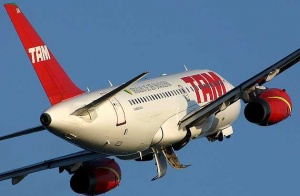TAM successfully complete first biofuel flight in Latin America

TAM Airlines has undertaken the first successful experimental flight in Latin America using aviation biofuel produced from the oil of the Jatropha curcas, a Brazilian vegetable biomass. The flight took place on the afternoon of 22 November and involved an Airbus A320 from its fleet, prefix PR-MHF, that normally has the capacity to transport up to 174 passengers in regular operation.
The plane was equipped with CFM56-5B engines manufactured by CFM International, a joint venture between United States’ GE and France’s Snecma (Safran Group).
The experimental flight had the technical approval of Airbus and CFM, and was authorized by the European Aviation Safety Agency (EASA) and Brazil’s National Civil Aviation Agency (Agência Nacional de Aviação Civil - ANAC). The flight, manned by two TAM pilots, took off from Rio de Janeiro’s international airport, Tom Jobim (Galeão), and flew in Brazilian air space over the Atlantic Ocean for 45 minutes before returning to its point of origin. In addition to the pilots, 18 other passengers, among them technicians and executives from TAM and Airbus, were on the flight.
Libano Barroso, president of TAM Airlines, says: “The involvement of TAM in this experimental flight shows our contribution in a vast project for the development of the production chain for this vegetable biomass biofuel, with the purpose of creating a Brazilian platform for sustainable aviation bio-kerosene.”
The next step in this innovative project is to implement and establish a crop of Jatropha curcas, in reduced scale, at TAM’s Technological Centre in São Carlos, located in the countryside in the state of São Paulo.
ADVERTISEMENT
“The goal of this unit will be to conduct technical and economic feasibility studies to start the implementation of an integrated value chain in Brazil, with the aim of producing biofuel based on Jatropha curcas oil, from the production of raw material to the distribution of bio-kerosene,” explains Barroso. He states that TAM is meeting its social and sustainability commitment, because the production of biofuel with Brazilian raw materials will result in important social and economic benefits, in addition to contributing to a considerable reduction in the emission of gases harmful to the environment.
The vegetable biomass, source of the aviation bio-kerosene used in the experimental flight, is 100% Brazilian, from family agricultural projects and sizeable farms in Brazil that are dedicated to the pioneer culture of the Jatropha curcas. Known in Brazil as pinhão manso, it is a plant that does not compete with the food chain because it is not suitable for human or animal consumption, and can be planted alongside pastures and food crops.
To ensure the availability of the necessary biofuel for the experimental flight, TAM purchased, through Curcas Brasil, seeds from Jatropha curcas producers in the North, Southeast and Central-West regions of Brazil, and arranged for its conversion into semi-refined oil which was then exported to the US where UOP LLC, a Honeywell group company, processed the Jatropha curcas oil into bio-kerosene and mixed it with conventional aviation kerosene, in the proportion of 50-50.
José Maluf, TAM’s vice-president of Supplies and International Contracts, highlights that the success achieved up to this phase of the project is the result of several companies working in partnership including Airbus, GE/CFM International, Curcas Brasil, ABPPM (Brazilian Association of Jatropha curcas Producers), and Air BP Brazil, BP’s aviation fuel distribution unit, which imported the biofuel based on Jatropha curcas, stored it, conducted the necessary tests and fuelled the aircraft.
“This flight was made with the cooperation of several partners,” Maluf notes. “We believe that the pursuit of sustainable solutions has to be a joint effort of the industry’s entire production chain.”
“The initiative announced today allows TAM and Airbus to take another step in the direction of setting the value chain,” says Paul Nash, Head of New Energies for Airbus. “This should serve as evidence of the aviation industry’s commitment to advance on the CO2 reduction targets that it set for itself – Carbon Neutral growth from 2020, working towards 50 percent C02 reduction by 2050. TAM’s young and modern Airbus fleet produces among the lowest carbon footprints in the region and makes initiatives like today’s possible, while leading the way for the rest of the industry to contribute to the cause.”
Studies conducted by the Michigan Technological University along with UOP / Honeywell have demonstrated that aviation biofuels made from Jatropha curcas enable a reduction of between 65% and 80% in carbon emissions in relation to petroleum-derived aviation kerosene.

